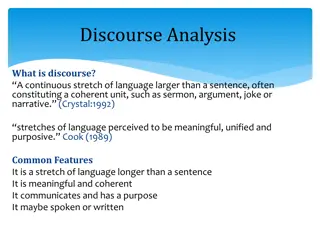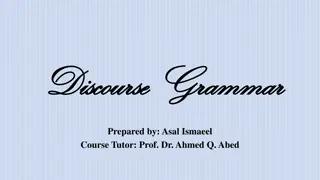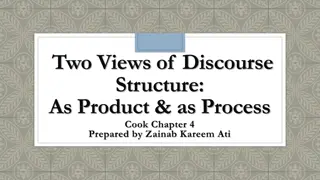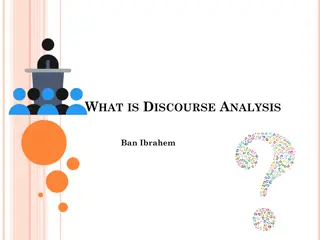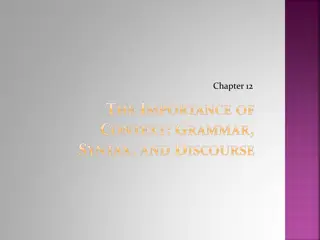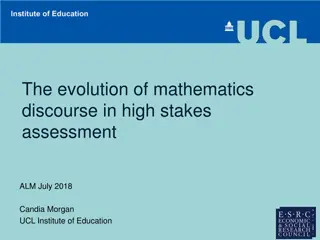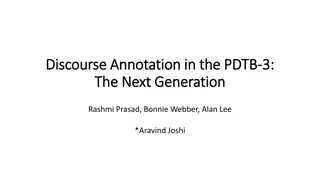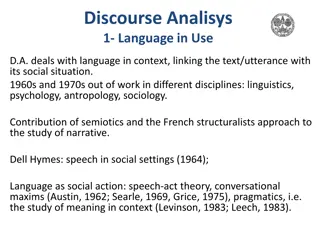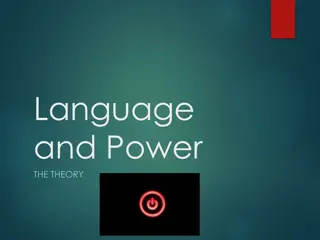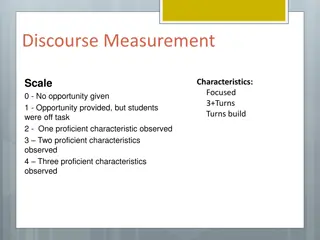Discourse Analysis of Judges 16:4-20 in the Book of Judges
This discourse analysis delves into the narrative structure and linguistic features of Judges 16:4-20 from the historical and hortatory discourse found in the biblical text. The analysis explores the usage of various verb forms, transitions, and narrative genres to uncover deeper insights into the text.
Download Presentation

Please find below an Image/Link to download the presentation.
The content on the website is provided AS IS for your information and personal use only. It may not be sold, licensed, or shared on other websites without obtaining consent from the author.If you encounter any issues during the download, it is possible that the publisher has removed the file from their server.
You are allowed to download the files provided on this website for personal or commercial use, subject to the condition that they are used lawfully. All files are the property of their respective owners.
The content on the website is provided AS IS for your information and personal use only. It may not be sold, licensed, or shared on other websites without obtaining consent from the author.
E N D
Presentation Transcript
- Judges 16:4-20 A Discourse Analysis
Judges 16:4-5 [Offline] Wayyiqtol of : Transition marker Genre: Historical Narrative [Mainline] Wayyiqtol Genre: Hortatory Discourse [Mainline] Imperative [Mainline] Imperative Genre: Predictive Narrative? [Offline] Weqatal: Consequence, purpose [Offline] X-Yiqtol: Topicalization Genre: Predictive Narrative?
Judges 16:6-7 Genre: Historical Narrative [Mainline] Wayyiqtol Genre: Hortatory Discourse [Mainline] Imperative Genre: Historical Narrative [Mainline] Wayyiqtol Genre: Predictive Narrative [Mainline] Yiqtol [Offline] Neg of any verb: Irrealis [Mainline] Weqatal Yiqtol + Weqatal series. In Procedural Discourse (-projection) = repeated/habitual/customary action in past (Rocine p. 206ff) In Predictive Narrative (+projection) = similar to above but in present/future (Rocine p. 356)
Genre: Historical Narrative [Mainline] Wayyiqtol Judges 16:8-9 [Offline] Neg of any verb: Irrealis [Mainline] Wayyiqtol [Offline] Participle: Backgrounded activities [Mainline] Wayyiqtol Genre: ? [Offline] Verbless Clause: Scene setting [Mainline] Wayyiqtol (maybe Embedded Procedural Discourse; see Rocine p. 210) [Offline] Yiqtol in dep. Clause: rel. non-past background [Offline] Neg of any verb: Irrealis ( freeze frame )
Judges 16:10-11 Genre: HN [Mainline] Wayyiqtol Genre: HN [Mainline] Qatal: open an oral HN Rocine p. 149ff [Mainline] Wayyiqtol Genre: Hortatory Discourse [Mainline] Imperative [Mainline] Jussive Genre: HN [Mainline] Wayyiqtol (See verse 7 above.)
Judges 16:12 Genre: HN [Mainline] Wayyiqtol [Mainline] Wayyiqtol [Mainline] Wayyiqtol Genre: ? [Offline] Verbless Clause: Scene setting [Offline] Participle: Backgrounded activities [Mainline] Wayyiqtol
Judges 16:13 Holman Christian Standard Bible (HCSB) footnote: LXX reads loom and fasten [them] with a pin into the wall and I will become weak and be like any other man." 14 And while he was sleeping, Delilah wove the seven braids on his head into the loom.
Judges 16:13 Genre: HN [Mainline] Wayyiqtol Genre: HN (see v. 10) [Mainline] Qatal or X-Qatal: opens an oral HN Genre: Hort. (see verse 10) Genre: HN [Mainline] Wayyiqtol (See verse 7 & 11 above.) Holman Christian Standard Bible (HCSB) footnote: LXX reads loom and fasten [them] with a pin into the wall and I will become weak and be like any other man." 14 And while he was sleeping, Delilah wove the seven braids on his head into the loom.
Judges 16:14 Genre: HN [Mainline] Wayyiqtol [Mainline] Wayyiqtol Genre: ? [Offline] Verbless Clause: Scene setting [Mainline] Wayyiqtol [Mainline] Wayyiqtol
Judges 16:15 Genre: HN [Mainline] Wayyiqtol Yiqtol: repetitive action in the past Qatal: attribution Negative Particle of Existence X-Qatal: Topicalization Irrealis w. Qatal Verbless Clause
Genre: HN As a native speaker of Hebrew Delilah had a number of styles available to her for putting the Judges 16:15 [Mainline] Wayyiqtol pressure on Samson. She could have voiced her complaint as a story, that is, as a series of events as follows: Yiqtol: repetitive action in the past Qatal: attribution Negative Particle of Existence X-Qatal: Topicalization HISTORICAL NARRATIVE 1. Then you told me 2. And you loved me 3. But your heart forsook me 4. And you mocked me 5. And you kept secrets The sixth clause does not translate as an event very well Irrealis w. Qatal Verbless Clause
Genre: HN As a native speaker of Hebrew Delilah had a number of styles available to her for putting the Judges 16:15 [Mainline] Wayyiqtol pressure on Samson. She could have voiced her complaint as a story, that is, as a series of events as follows: Yiqtol: repetitive action in the past Qatal: attribution Negative Particle of Existence X-Qatal: Topicalization HISTORICAL NARRATIVE 1. Then you told me 2. And you loved me 3. But your heart forsook me 4. And you mocked me 5. And you kept secrets The sixth clause does not translate as an event very well Irrealis w. Qatal Verbless Clause If Delilah would have chosen to complain in this manner she would have chosen the series of wayyiqtols.
Genre: HN Then again, there is another kind of discourse that you will learn about in Module Four which Judges 16:15 [Mainline] Wayyiqtol Delilah could have used which may have been a more appropriate choice than the Historical Narrative. Yiqtol: repetitive action in the past Qatal: attribution Negative Particle of Existence X-Qatal: Topicalization Irrealis w. Qatal Verbless Clause
Procedural Discourse tells how something used to be done in the past. It is usually the Judges 16:15 Genre: HN discourse of choice when the writer wanted to describe repeated, habitual action in the past. [Mainline] Wayyiqtol It would have been a very appropriate choice for Delilah to stress that Samson kept mocking her and so forth. In fact, the first form Delilah uses, the yiqtol, very often initiates a Procedural Discourse. Here is how a Procedural Discourse would have sounded: Yiqtol: repetitive action in the past Qatal: attribution Negative Particle of Existence X-Qatal: Topicalization Irrealis w. Qatal PROCEDURAL DISCOURSE 1. You kept telling me 2. I am a lover of you 3. But you would be a mocker of me 4. And your heart would be a forsaker of me 5. And you would be a keeper of secrets Again, we will leave the sixth clause out. Verbless Clause
However, the mainline verb form of Procedural Discourse is the weqatal, and Delilah does not Judges 16:15 Genre: HN use a single weqatal in her speech. Rather, she chooses 5 out of 6 (clauses 2 6) verb forms or [Mainline] Wayyiqtol clause types that are stative or adjectival in nature. Her little tirade is more about the kind of person Samson is than it is about anything he has done once or repeatedly. Yiqtol: repetitive action in the past Qatal: attribution Negative Particle of Existence X-Qatal: Topicalization Irrealis w. Qatal PROCEDURAL DISCOURSE 1. You kept telling me 2. I am a lover of you 3. But you would be a mocker of me 4. And your heart would be a forsaker of me 5. And you would be a keeper of secrets Again, we will leave the sixth clause out. Verbless Clause
However, the mainline verb form of Procedural Discourse is the weqatal, and Delilah does not Judges 16:15 Genre: HN use a single weqatal in her speech. Rather, she chooses 5 out of 6 (clauses 2 6) verb forms or [Mainline] Wayyiqtol clause types that are stative or adjectival in nature. Her little tirade is more about the kind of person Samson is than it is about anything he has done once or repeatedly. Yiqtol: repetitive action in the past Qatal: attribution Negative Particle of Existence X-Qatal: Topicalization Irrealis w. Qatal Verbless Clause Do you remember the initial wayyiqtol of this entire reading? It is with which the narrator of the account seems unwilling to do the very thing that Delilah is doing during this speech criticize Samson s character.
EXPOSITORY DISCOURSE The question therefore remains: If Delilah did not use Historical Narrative or Procedural Discourse, what kind of discourse did she use. The answer is Expository Discourse. Expository Discourse is one of the least studied genres because passages of Expository Discourse in the prose sections of the Hebrew Bible are fairly infrequent and usually quite short. This writer believes that Expository Discourse is critical to the subject of Biblical Hebrew poetry, but since this course is devoted only to prose, we won t spend much time studying Expository Discourse.
EXPOSITORY DISCOURSE Recall that a genre is defined by the task it performs and the constructions which characterize it (see the introduction to Module One). The task in Expository Discourse is to explain and/or argue a thesis. Most of this book is Expository Discourse! The mainline construction in Biblical Hebrew Expository Discourse is that one which is best suited to making a statement: the verbless clause. Other nominal-type clauses like X-qatal and clauses formed with verbal participles are probably high-ranking. The lowest ranking clause-types are probably yiqtol and wayyiqtol constructions. In some ways, the discourse profile scheme for Expository Discourse is the Historical Narrative scheme flipped up-side-down. Below is a tentative discourse profile scheme for Expository Discourse. TENTATIVE EXPOSITORY DISCOURSE PROFILE SCHEME: 1. Mainline: Verbless clause Off-the-line: 2. Clauses with qatal of 3. X-qatal of other roots 4. Clauses with yiqtol with a present time reference, irrealis 5. Qatal and yiqtol in dependent clauses 6. Embedded discourse Rocine 319
Judges 16:16 Genre: HN [Offline] Wayyiqtol of : Transition marker [Mainline] Wayyiqtol [Mainline] Wayyiqtol
Judges 16:17 Genre: HN [Mainline] Wayyiqtol [Mainline] Wayyiqtol Genre: Historical Narrative [Offline] X-Qatal: emphasis on state Non-standard word order [Offline] Verbless clause Genre: Predictive Narrative [Offline] X-Qatal: emphasis on state [Mainline] WeQatal [Mainline] WeQatal
Judges 16:17 Genre: HN [Mainline] Wayyiqtol [Mainline] Wayyiqtol Genre: Historical Narrative [Offline] X-Qatal: emphasis on state Non-standard word order [Offline] Verbless clause Genre: Predictive Narrative [Offline] X-Qatal: emphasis on state [Mainline] WeQatal [Mainline] WeQatal In his first three responses to Delilah s inquiries his responses were (vs. 7), if they bind (V. 11), and if you weave (V. 13). In contrast, we have here an - yiqtols: if they bind - qatal.
Judges 16:17 Genre: HN [Mainline] Wayyiqtol [Mainline] Wayyiqtol Genre: Historical Narrative [Offline] X-Qatal: emphasis on state Non-standard word order [Offline] Verbless clause Genre: Predictive Narrative [Offline] X-Qatal: emphasis on state [Mainline] WeQatal [Mainline] WeQatal Samson is making it clear that the secret to conquering him does not lie in what others do to him. Rather he can only be bound if he will in some way be a changed man. Remember that the qatal is the form used to pin an attribute on its subject.
Judges 16:17 Genre: HN [Mainline] Wayyiqtol [Mainline] Wayyiqtol Genre: Historical Narrative [Offline] X-Qatal: emphasis on state Non-standard word order [Offline] Verbless clause Genre: Predictive Narrative [Offline] X-Qatal: emphasis on state [Mainline] WeQatal [Mainline] WeQatal Our understanding is that shaved becomes the attribute of Samson. He is then weak, not because he has lost some mystical power in his hair. He has lost his holy identity. The hair is one of the marks of his consecration to YHWH. Whereas the narrator earlier avoided the qatal form when describing Samson s love for Delilah, here Samson himself uses the qatal form in revealing the secret of his strength, his holy identity.
Judges 16:18 qere kethib
Genre: HN Judges 16:18 [Mainline] Wayyiqtol qere [Offline] Qatal in dep. clause [Offline] Qatal in dep. Clause: Rel. past background [Mainline] 2 Wayyiqtols Genre: Hort. kethib [Mainline] Imperative Genre: HN [Mainline] Wayyiqtol
Genre: HN Judges 16:18 [Mainline] Wayyiqtol qere [Offline] Qatal in dep. clause [Offline] Qatal in dep. Clause: Rel. past background [Mainline] 2 Wayyiqtols Genre: Hort. kethib [Mainline] Imperative What is this? Genre: HN [Mainline] Wayyiqtol
Genre: HN Judges 16:18 [Mainline] Wayyiqtol qere [Offline] Qatal in dep. clause [Offline] Qatal in dep. Clause: Rel. past background [Mainline] 2 Wayyiqtols Genre: Hort. kethib [Mainline] Imperative What is this? Mainline or offline? What genre? Genre: HN [Mainline] Wayyiqtol
Genre: HN Judges 16:18 [Mainline] Wayyiqtol qere [Offline] Qatal in dep. clause [Offline] Qatal in dep. Clause: Rel. past background [Mainline] 2 Wayyiqtols Genre: Hort. kethib [Mainline] Imperative What is this? Mainline or offline? What genre? What kind of waw? consecutive/conversive/reversive/ha-hipukh or conjunctive Genre: HN [Mainline] Wayyiqtol
Genre: HN Judges 16:18 [Mainline] Wayyiqtol qere [Offline] Qatal in dep. clause [Offline] Qatal in dep. Clause: Rel. past background [Mainline] 2 Wayyiqtols Genre: Hort. kethib [Mainline] Imperative [Mainline] Isolated Weqatal Genre: HN [Mainline] Wayyiqtol RULE: An isolated weqatal that stands in for a wayyiqtol within a wayyiqtol string marks a climactic or pivotal event in a narrative. (Rocine p. 322)
Genre: HN Judges 16:18 [Mainline] Wayyiqtol qere [Offline] Qatal in dep. clause [Offline] Qatal in dep. Clause: Rel. past background [Mainline] 2 Wayyiqtols Genre: Hort. kethib [Mainline] Imperative [Mainline] Isolated Weqatal Genre: HN [Mainline] Wayyiqtol RULE: An isolated weqatal that stands in for a wayyiqtol within a wayyiqtol string marks a climactic or pivotal event in a narrative. (Rocine p. 322) We will spend a lesson on this rule in Module Four [Rocine Lesson 37, p. 212]. The point is for this reading that the lords of the Philistines had not earlier come up to bind Samson. But Delilah had control of Samson for sure this time, so she was calling in the big guns. The Hebrew writer marks the lords coming up as a pivotal event in Samson s life, and so it is.
Judges 16:19 Genre: HN [Mainline] Wayyiqtol [Mainline] Wayyiqtol [Mainline] Wayyiqtol [Mainline] Wayyiqtol [Mainline] Wayyiqtol
Judges 16:20 Genre: Historical Narrative [Mainline] Wayyiqtol Genre: ? [Offline] Verbless Clause: Scene setting [Mainline] Wayyiqtol [Mainline] Wayyiqtol Genre: Predictive Narrative [Mainline] Cohorative [Mainline] Cohorative Genre: Historical Narrative [Offline] Qatal in dep. Clause: rel past background X-Qatal: Topicalization of YHWH [Offline] X-Qatal/Irealis: Scene setting, attributive
Judges 16:20 Genre: Historical Narrative [Mainline] Wayyiqtol Genre: ? [Offline] Verbless Clause: Scene setting [Mainline] Wayyiqtol [Mainline] Wayyiqtol Genre: Predictive Narrative [Mainline] Cohorative [Mainline] Cohorative Genre: Historical Narrative [Offline] Qatal in dep. Clause: rel past background X-Qatal: Topicalization of YHWH [Offline] X-Qatal/Irealis: Scene setting, attributive Here we have not only the qatal in a dependent clause but an X-qatal. This construction and the preceding irrealis are used to summarize the state-of-things at the end of the episode.
Conclusion: The Samson Reveals the Secret of His Strength account is one episode in the larger story, the Life of Samson. The Life of Samson is, in turn, one part of the account given by the book of Judges. If indeed the theme of the book of Judges is maintaining a holy identity, the account of Samson and Delilah serves the theme well. Moreover, even the verb forms applied by the writer both in the narration and direct speech serve the theme well. In the reading we have seen yiqtol and wayyiqtol verb forms which express emerging action are played off against those constructions which are of a stative or adjectival nature, namely the X-qatal, weqatal, verbless clause, clause, and irrealis. These verb forms are strategically placed by the writer as follows: A wayyiqtol Vs. 4 as an episode opener where an X-qatal is expected Three yiqtols Vss. 7, 11, 13 in which Samson lies about what others may do to him to take his strength away A series of five stative clauses Vs. 15 in which Delilah criticizes Samson s character A series of six stative clauses Vs. 17 in which Samson reveals his holy identity and the secret of his strength An irrealis and X-qatal Vs. 20 as a summary of Samson s state after he had lost his an identity



